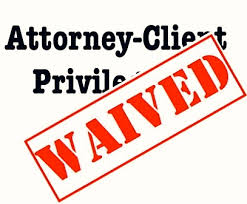
Oldhauser v Kasian 2021 BCSC 892 rejected an application to find the defendant breached solicitor client privilege by inserting his legal advice into his argument but the court rejected any implied waiver of privilege.
Legal advice given to a client by his or her lawyer is said to be privilege and totally confidential between them.
Solicitor-client privilege is fundamental to the justice system and the integrity of the administration of justice depends on the unique role of the solicitor who provides legal advice to clients within the legal system.
Solicitor-client privilege must be as close to absolute as possible to ensure public confidence and retain relevance; therefore, privilege will only be abrogated where absolutely necessary, applying as restrictive a test as may be formulated short of an absolute prohibition in every case.
Solicitor-client privilege will only yield in certain clearly defined circumstances and does not involve a balancing of interests on a case-by-case basis. Solicitor client privilege ought not to be abrogated unless the subject matter of the privileged material will clearly be fundamentally determinative of the claim or the application in respect of which waiver is alleged.
Soprema Inc. v. Wolridge Mahon LLP, 2016 BCCA 471 at para 51, citing R. v. McClure, 2001 SCC 14; G.W.L. Properties Ltd. v. W.R. Grace & Co. of Canada Ltd. (1992), 34 A.C.W.S. (3d) 1209, 1992 CanLII 182 at paras. 15–17; Araya v Nevsun Resources, 2019 BCCA 205 at para. 20; para. 41.
It was contended that Mr. Kasian waived solicitor-client privilege because he voluntarily injected his understanding of his legal position and/or his reliance on legal advice to justify his conduct and acted in a manner inconsistent with the maintenance of the privilege:
In Soprema 2016 BCCA 471 the court warned that the court must tread cautiously when assessing an allegation of implied waiver of privilege:
The starting point of an articulation of the test for implied waiver must recognize what the Supreme Court of Canada has made clear about the importance of solicitor-client privilege.
In R. v. McClure, 2001 SCC 14 at para. 35, the Court said that solicitor-client privilege “must be as close to absolute as possible to ensure public confidence and retain relevance. As such, it will only yield in certain clearly defined circumstances, and does not involve a balancing of interests on a case-by-case basis”…. Furthermore, the Court said (at para. 17) that solicitor-client privilege “is part of and fundamental to the Canadian legal system. … [I]t has evolved into a fundamental and substantive rule of law.”
This view was affirmed in Goodis v. Ontario (Ministry of Correctional Services), 2006 SCC 31 at paras. 20 21, where the Supreme Court of Canada made clear that communications protected by privilege should be disclosed only where “absolutely necessary”, applying “as restrictive a test as may be formulated short of an absolute prohibition in every case.”
[Emphasis in original.]
In H.M.B. Holdings Limited v. Replay Resorts Inc., 2018 BCCA 263 [H.M.B. Holdings], Justice Hunter examined the concept of a party voluntarily injecting into the litigation legal advice received by them. He articulated it this way:
This Court reviewed these principles in Soprema. The trial judge in Soprema had held that a party may impliedly waive privilege if it put its “state of mind” in issue in a manner establishing a clear nexus between its state of mind and the privileged communications. This Court reversed, holding that “a party must voluntarily inject into the litigation legal advice it received or its understanding of the law before waiver can be implied” (at para. 49).
In Soprema, this Court explained that “voluntarily injecting into the litigation” requires more than a statement of a litigant’s understanding of the law. It normally would require a pleading of reliance on legal advice (or the absence of legal advice, as in Do Process LP v. Infokey Software Inc., 2015 BCCA 52): Soprema at para. 6. In a proper case, evidence of such reliance if it goes to a material issue may be sufficient, and even argument that the evidence shows reliance on legal advice can give rise to an implied waiver: R. v. Campbell, [1999] 1 S.C.R. 565.



